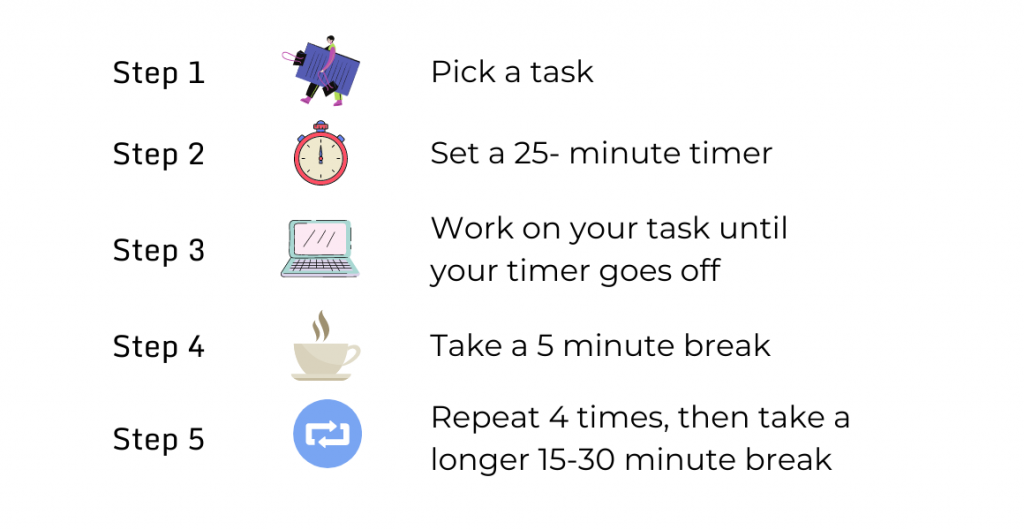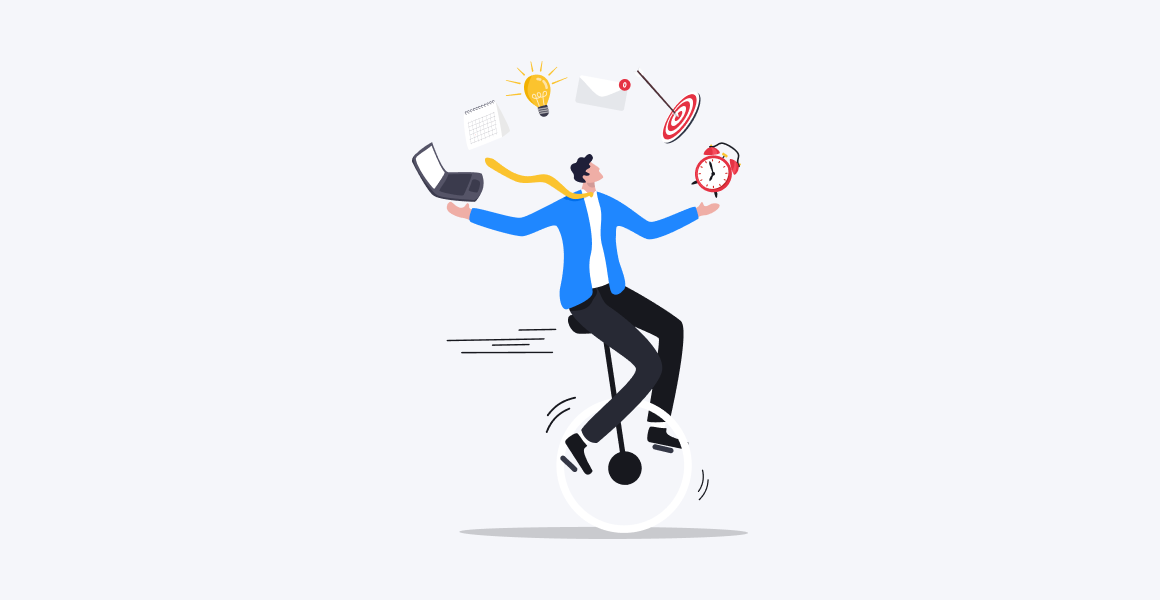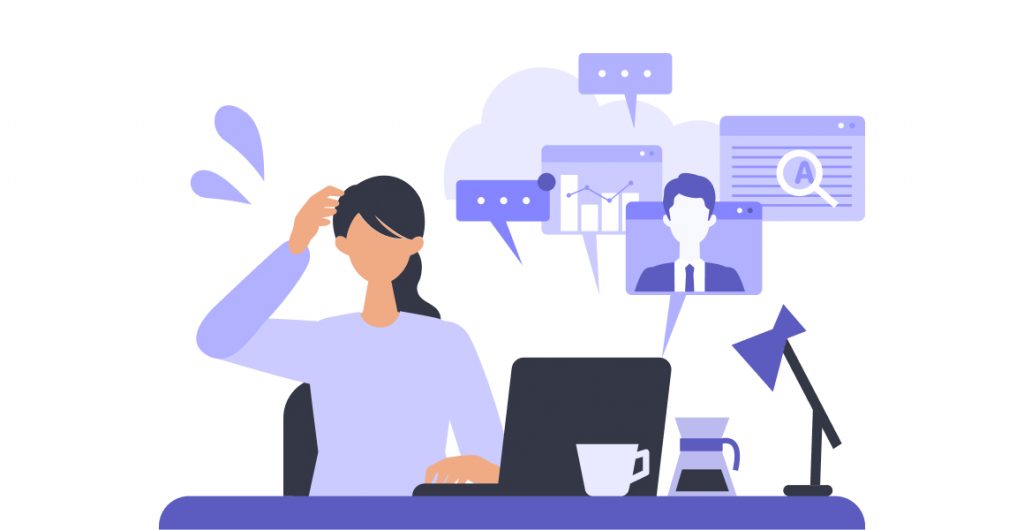Everybody multitasks to a certain extent. We have conversations while driving. We scroll through Instagram while watching Netflix. For most a world of constant single-tasking is too absurd to even contemplate. But science suggests that multitasking as we know it is a myth. Especially in the world of work. Multitasking is when someone tries to perform two or more tasks simultaneously. As humans our brains are wired to be monotaskers, meaning our brains can only truly focus on one task at a time, according to neuropsychologist Cynthia Kubu, PhD.
"Humans don't really multitask," said Eyal Ophir, the primary researcher with the Stanford Multitasking study. "We task-switch. We just switch very quickly between tasks, and it feels like we're multitasking."
Why being a good multitasker isn't necessarily a good thing.
You may think you’re a master multitasker, but are you? The science says it’s unlikely. One study found that only 2.5% of people are able to multitask effectively. For the other 97.5% of people our attempts to do multiple activities at once, actually come at a price. When you move from one task to another, you actually lose precious time. You’re may be aware of that, but what you may not realize is just how much it affects you. Over the course of a day, this can reduce productivity and negatively impact the quality of your work.
Why do we think we're so good at something that doesn't exist?
We compensate for our inability to multitask with a remarkable ability to single-task in rapid succession.
"Our brains aren't a volley of a thousand arrows descending on an opposing army. Our brains are Robin Hood. One man with one bow firing on all comers, one at a time." - Derek Thompson
Multitasking doesn’t necessarily not exist, most people just aren’t actually effective at it. But what about the 2.5% of people that can successfully multitask? A famous media multitasking study found that "heavy" multitaskers are more susceptible to distractions which makes sense if you consider multitasking to be "the art of paying attention." Heavy multitaskers tend to roll out the welcome mat for every new distraction.
"I think heavy multitaskers are not less effective -- they simply have a different goal" says Ophir.
Ophir says where you might say traditionally we value the ability to focus through distractions, they are willing to sacrifice focus in order to make sure they don't miss an unexpected, but rewarding, surprise. As a result, they might do worse in an office scenario, but they might also be the first to slam on the brakes in a car/mobile phone scenario.
So, why is being a good multitasker on everyone's resume?
We are taught to believe in our hustle culture that in order to succeed we need to always be doing more than one task at a time. In order to get all of our work done in the time allotted time, we need to be focused on more than one task at a time. When in reality you save time by completing one task at a time, rather than task switching constantly and losing time and energy on multiple tasks and none were completed to their full potential. We are taught it is a positive word and that we should all be good at it. Where in reality saying you are a good multitasker may mean to your employer you can’t focus through distractions and task switch constantly. This is not necessarily a bad thing, as everyone has different goals and skills. It just may not mean what you think it means when you put it on your resume.
Do you multitask?
Whether you call it multitasking, context switching, or task switching, chances are you do at least a little back and forth between projects throughout the day. It’s important to be aware of what you’re doing if you want to be more productive.
Stop and think about how you work. Do you start on one task and stay with it until it’s completed? It doesn’t count if you’re stopping to look at incoming messages or chatting with colleagues who stop by your office. Or do you jump between tasks throughout the day, attending to whatever comes along while also trying to log some work on your more long-term projects? Do you work on multiple tasks and projects at one time? Do you talk to your mom on speaker phone while sending emails? Multitasking can look different to different people, and in different settings. It is a great first step to start recognizing when you do it and if it is negatively impacting both tasks, one, or neither.
How can you get out of the habit of multitasking?
For most people, multitasking is a habit developed over years. But there’s good news. You can break that habit with some fierce discipline and the right mindset. Here are some tips to help you kick multitasking to the curb.
- Try using the Pomodoro technique to force yourself to work in timed increments, allowing for breaks:

Set a timer on your phone and ignore all incoming messages and calls and stay off the internet until the timer reaches its end. Make sure, during each sprint, that you focus on one task at a time, only shifting to the next once you’ve completed the one before it.
- Declutter your desktop. Yes, concentration is an issue, but you also lose time when you close one app and move to another. With Shift, you can set up a desktop that contains all your most frequently used apps. You can even add multiple instances of an app with different logins. For instance, you can set up your work and personal Gmail accounts to operate as separate shortcuts, reducing the need to log out and in each time. This will cut down on the precious minutes you spend searching, opening, and logging into various apps, while also helping you stay focused.
- Work from a list. Each day, make a list of your tasks, in order of priority, and tackle one at a time until you’ve reached the end. Reward yourself when you reach the end if you accomplish your goal of staying focused on each task without allowing yourself to be distracted.
- Break your work into manageable chunks. It’s unreasonable to expect that you might be able to complete a long-term project in one eight-hour workday. Looking at it as a big task can make it seem overwhelming, pushing you to procrastinate by switching to other tasks. Instead, divide the project into bite-size pieces that you can check off individually. With each item completed, you’ll feel a sense of accomplishment that will move you forward.
- Block off time. Some professionals find it works well to designate certain times of day for specific tasks. If you’re most creative in the morning, for instance, use that time for planning and brainstorming. If you suffer from an after-lunch slump, that could be a good time to tidy your desk or check your email while walking around.
- Delegate and reduce. If you find yourself constantly overloaded with work, consider ways to get rid of some of it. If you can delegate or outsource to a virtual assistant, it might be well worth it to free up some time. But in the end, you may simply have to start saying no to tasks that will take you away from getting your most important work done.
- Take work breaks. Sitting too long comes at a cost to your health. Make sure you take a break occasionally, but don’t make it a break to check email or tend to other work tasks. Instead, get up and walk around. Chances are, when you sit down again, you’ll feel refreshed and ready to tackle the next task in front of you.
Related article: The Problem with Multitasking (and How to Solve it!)
















 Share on Facebook
Share on Facebook Share on Twitter
Share on Twitter







